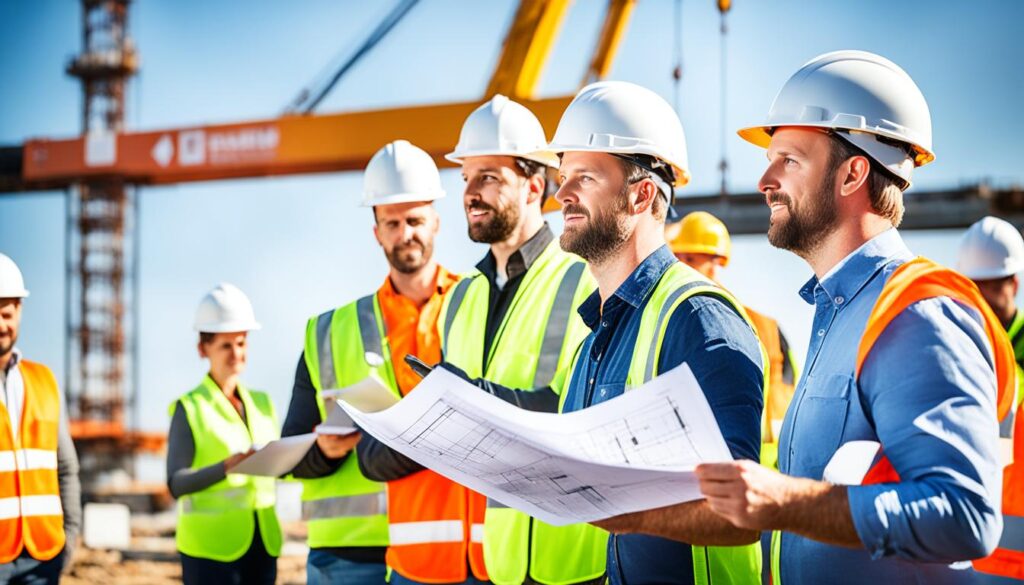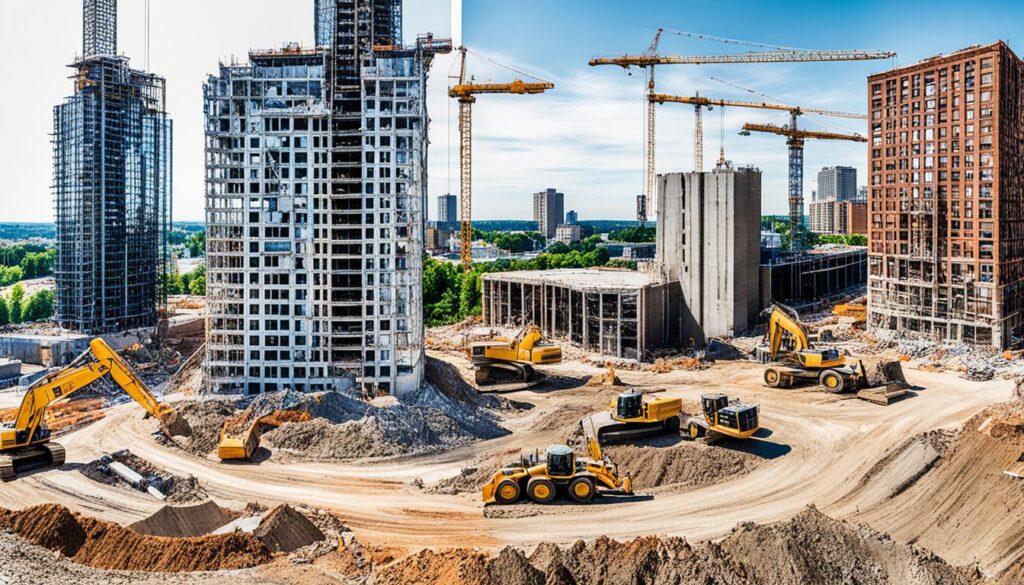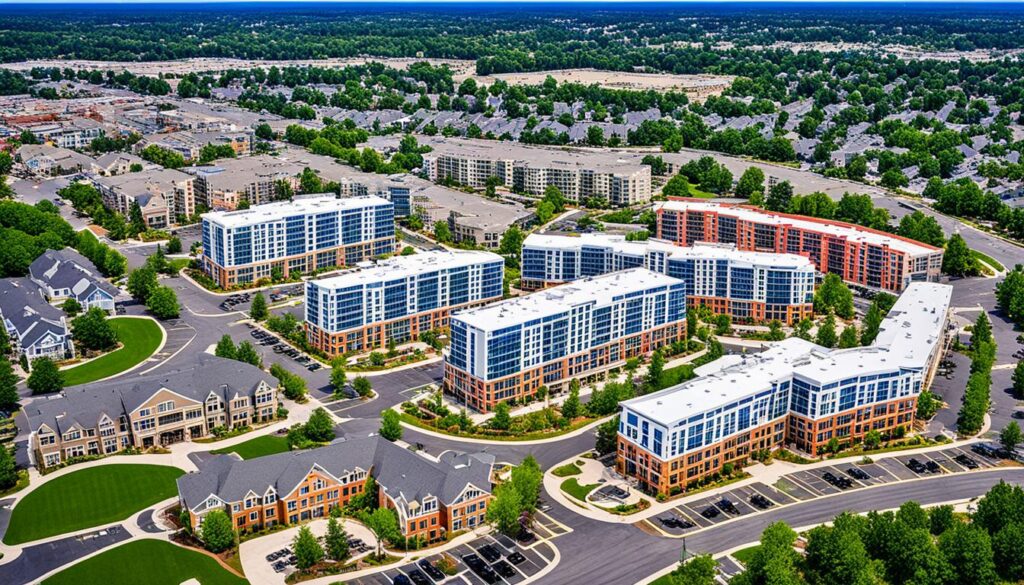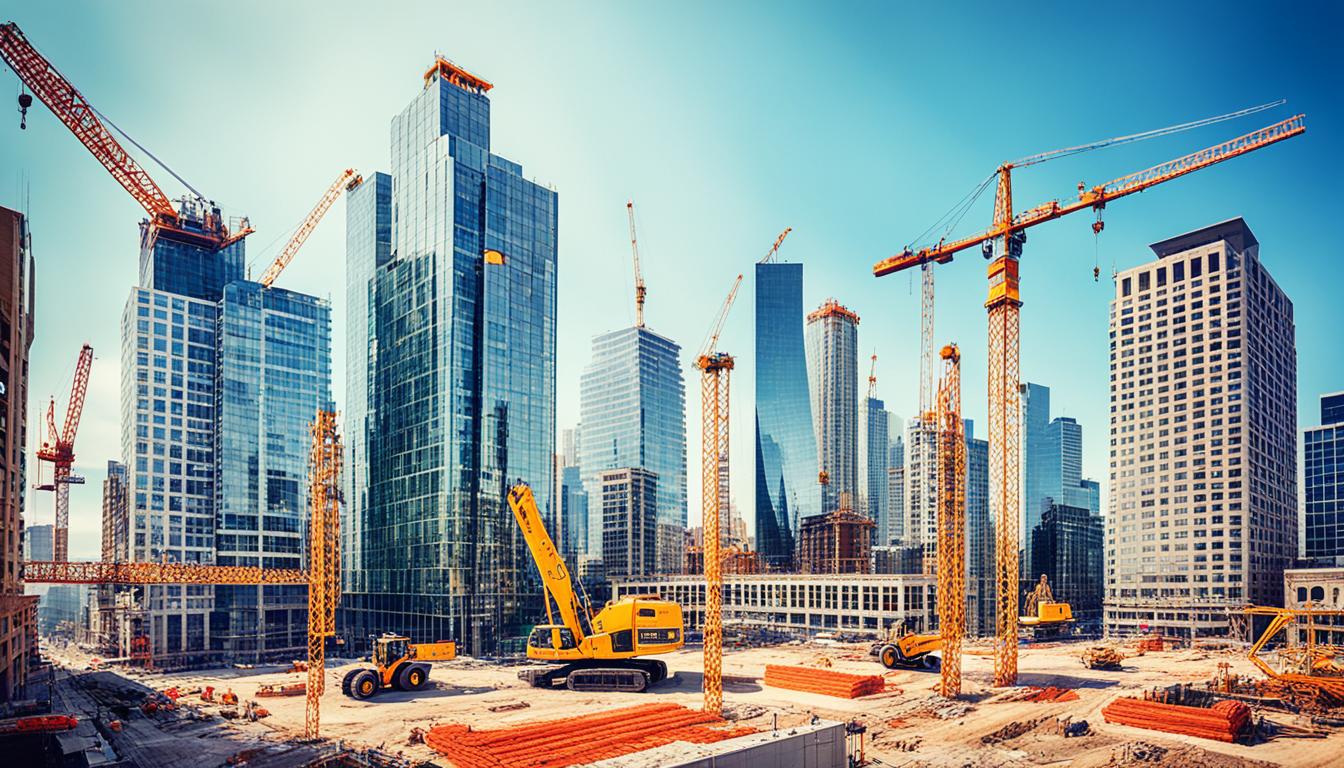Real estate development involves changing land into something new. This process includes fixing up old buildings, buying land, and then selling that land after making it better. Developers turn ideas into actual places. It’s different from building houses; although, they might also build the new places.
Developers do a lot of things. They buy the land, figure out how to fund the project, handle the building work, and then sell or rent the final product.
Key Takeaways:
- Real estate development means fixing up, buying, and selling places.
- Developers change plans into real buildings and spaces.
- They also manage buying land, getting money, and building the project.
- Selling or renting and getting the okay for their work are key steps too.
- This work is separate from just building homes.
The Role of Real Estate Developers
Real estate developers are key in building our towns and cities. They handle every step from buying the land to selling the property. We’ll delve into their many tasks and important roles further.
Land Purchase and Financing
Developers start by finding the right land. They look at what’s selling, assess risks and rewards, and decide if a piece of land is worth buying. To pay for the land and the building costs, they get money from banks, investors, or by working with others.
Project Management and Development Process
From beginning to end, developers watch over everything. This includes making design plans, getting approvals, and handling the building process. They work with a team of experts to ensure the project is done well. This keeps the quality high.
Risk and Rewards
Building comes with risks like changing markets or rules. Developers face these by studying the market and planning carefully. If everything goes well, they can make a good profit from selling or renting out the property. Knowing how to manage risks is a must for them.
Marketing and Public Approval
Once the building is finished, developers work hard to find buyers or renters. They use ads, online tools, and real estate agents to get the word out. They also get in touch with the local community to make sure people like their work.
Structure Management and Property Sale
After a property is sold or rented, developers may still be in charge. They take care of upkeep, choose tenants, and set up lease agreements. Their goal is to make a good return on their investment by selling or renting at the best prices.
In the world of real estate, developers stand at the front. They bring lands to life, handle funds, lead in building, manage risks, market, and oversee properties. They shape the places we live and work. Their smart plans, risk management, and problem-solving help the real estate field grow and succeed.

| Responsibilities | Description |
|---|---|
| Land Purchase | Identify and acquire suitable land for development projects |
| Financing | Secure funding through banks, investors, or joint ventures |
| Project Management | Oversee the entire development process, from conception to completion |
| Risk and Rewards | Assess and manage risks while seeking profitable returns |
| Marketing and Public Approval | Promote properties and engage with the community for public support |
| Structure Management | Manage properties, maintenance, tenants, and lease agreements |
| Property Sale | Sell or lease developed properties at favorable prices |
Types of Real Estate Development
Real estate developers have different ways of doing things. It all depends on what they know and what they have. Here, we’ll look at two ways they often go about their work.
Property Sourcing and Immediate Development
Some developers hunt for properties first. This step involves finding and buying properties they believe can grow. They look for places that are already popular or ones that are likely to be in the future. Then, they get all the necessary paperwork and permissions so they can start working right away.
This strategy helps avoid delays in getting approval to build. It means they can start building fast. After getting all approvals, they’re set to move quickly and get the project done on time.
Purchase of Properties with Existing Plans and Permits
Another way is to buy properties that already have the green light to build on. This is great for developers who also build. With everything in place, they can skip the long wait for approvals and get straight to work.
It lets them put all their focus on the building part. Their work becomes more efficient. This way, projects get done faster, and their expertise is put to good use.
| Property Sourcing and Immediate Development | Purchase of Properties with Existing Plans and Permits |
|---|---|
| Minimizes the risk of failing to acquire planning approval | Bypasses lengthy approval processes |
| Allows for immediate development | Enables developers to focus on construction |
| Requires thorough research and due diligence in property sourcing | Requires careful evaluation of existing plans and permits |
Each method has its benefits. Developers can pick the one that suits them best. Whether they choose to source properties or buy those ready to build on, their work helps shape our cities and towns.
The Real Estate Development Process
The journey into real estate begins with essential steps. It starts with research and budgeting and ends with the property’s sale or lease. This overview highlights the critical stages of real estate development.
1. Research and Budgeting
Prior to starting a project, developers dive deep into research. They check if the project will be profitable. This phase includes looking at what properties are needed and if the project makes financial sense. Setting a budget is crucial. It covers costs for buying land, designing, building, and other fees.
2. Consultation and Design
Next, developers talk with local officials about their project. These talks help developers better understand local rules, environmental issues, or community concerns. They then design the property. This includes making it work well, look good, and meet legal rules.
3. Applications and Public Hearings
With the design in hand, developers ask for permits and approvals. Sometimes, there are public meetings about the project. These give locals a chance to speak up. It helps make sure everyone understands and agrees.
4. Approval, Financing, and Contracts
After getting the green light, developers secure money for the project. They might get loans, find investors, or make deals with other companies. They also sign agreements with the people who will help build the project, like architects and builders.
5. Construction and Permits
With the money and team in place, it’s time to build. Developers make sure everything follows the approved plans and rules. As the building finishes, they get the needed permits. This shows the project is safe and legal.
6. Sale or Lease
After construction and permits, the property is ready to be sold or rented. Developers use many ways to get the word out to potential customers. They focus on what makes the property special and needed in the market.
Following these steps, real estate developers turn their ideas into real places. These properties help meet the community’s needs and add to the area’s life.
| Stage | Description |
|---|---|
| Research and Budgeting | Evaluating market trends and assessing financial feasibility |
| Consultation and Design | Engaging with local government officials and creating preliminary designs |
| Applications and Public Hearings | Submitting necessary applications and gathering community input |
| Approval, Financing, and Contracts | Finalizing financing, securing contracts, and obtaining approvals |
| Construction and Permits | Overseeing construction and obtaining building permits |
| Sale or Lease | Marketing and selling/leasing the developed property |

Commercial vs. Residential Real Estate Development
Real estate developers can choose to work in either commercial or residential property development. Both areas have their unique set of challenges and opportunities. Here, we’ll dive into the differences.
Project Size and Complexity
Commercial projects are often bigger and harder to tackle than homes. Buildings like office spaces, malls, and hotels take a lot of planning and work. They need complex designs and special facilities for businesses.
On the other hand, housing development is about creating homes for people. This can range from a few houses to big apartments. Even though it’s not as intricate as commercial projects, residential building still needs serious thought.
Construction Materials and Specifications
Commercial buildings require tougher materials due to their use. These materials need to meet safety rules. Using the best materials and building methods makes commercial buildings last longer.
For housing, builders focus on making places look and feel good. Quality is important, but it’s more about how the house looks and feels rather than just how strong it is.
Financing Requirements
It’s usually more expensive to start commercial projects than residential ones. The big costs of buying land and building need a lot of money.
With homes, it may be easier to find funding for smaller projects. But, the cost still changes depending on the location and size of the project.
Stakeholders and Timelines
Building commercial spaces means dealing with many groups. These include tenants, investors, and local governments. Working with these different groups needs good communication.
Building houses is mainly about working with people who will live there. It’s simpler than the commercial side, with fewer groups to liaise with. This includes talks with builders and local authorities.

Commercial and residential developments are very different. Commercial ones are usually bigger, need more work, and cost more. Making homes is about creating living spots that are cozy for families.
When choosing between the two, developers look at what they want to achieve and their skills.
How to Get Started in Real Estate Development
There are many ways to start in real estate development. You can flip properties or build new ones. The industry is full of chances to grow and succeed.
1. Become a Real Estate Agent: Begin as an agent to learn about the industry. It helps with understanding property deals. This knowledge is key for investing later as a developer.
2. Explore Property Flipping: Flipping homes means buying low, improving them, then selling at a higher price. It teaches you to spot good deals and enhance value through hands-on work.
3. Gain Construction Experience: A construction job gives you inside info on building. It helps a lot in leading projects and working well with experts like architects and builders.
4. Join a Real Estate Development Company: Joining a top development firm lets you learn from the best. It builds a solid base for your future projects, introducing you to the industry’s challenges and rewards.
5. Seek Developing Consultancy: Developing consultancies offer insights on market trends and development steps. They’re key in planning and financially structuring projects. This knowledge is critical for going independent in the future.
It is important to keep learning and connecting with others. Attend conferences and maintain your network in the real estate world. This will help you stay ahead and succeed in the challenging field of real estate development.
Education and Experience in Real Estate Development
Education and experience are key for those who want to be real estate developers. Going to school for real estate finance or related fields is a great first step. A master’s degree or even an MBA can help you dive deeper into real estate development.
Getting certified and taking more classes also helps a lot. The CCIM Institute and NAIOP offer special courses and events. These keep you connected to what’s new and good in the industry.
But it’s not just what you learn in school. You also need hands-on experience. This can come from internships or working for real estate companies. Helping in areas like construction or finance shows you how the industry really works.
It’s also about the people you know. Making friends with folks who have been in the business can teach you a lot. They can show you what to do and what to avoid.
Benefits of Education and Experience in Real Estate Development
“Knowledge and experience are the base of a real estate career. Mixing what you learn in class with real-world practice helps a lot. Always learning and getting practical experience keeps you at the top of your game.”
Opportunities for Education and Development
You can learn and grow in real estate development in many ways. Here’s how:
- Sign up for real estate programs in colleges or universities. You’ll study things like market trends and property management.
- Do internships. They’re a great way to learn and meet people in the industry. You’ll help with research and project work.
- Earn certifications. Groups like the CCIM Institute and NAIOP offer these. They prove your skills in specific areas of real estate.
- Find a mentor. A mentor can give you great advice and support. They’ve been in your shoes and can help you succeed.
- Keep learning through more courses and events. Staying updated with the latest in real estate is very important. These programs also help you meet others in the field.
All these steps help you build the knowledge, skills, and connections you need. They push you towards a great career in real estate development.
Real Estate Development Education and Experience Tracker
| Educational Achievement | Relevant Courses | Experience |
|---|---|---|
| Undergraduate Degree | Real Estate Finance, Property Development, Economics, Business Law | Internships at a real estate development firm |
| Master’s Degree | Real Estate Investment Analysis, Market Analysis, Urban Planning | Worked as a project coordinator for a real estate development company |
| Certifications | CCIM – Certified Commercial Investment Member, NAIOP – Commercial Real Estate Development Association | Assisted in managing a retail property redevelopment project |
| Continuing Education | Real Estate Market Trends, Sustainable Development, Risk Management | Attended industry conferences and workshops |
This tracker shows key steps in building a strong real estate development career. With the right resources and a drive to learn, you can set yourself up for success in real estate.

The Real Estate Developer’s Role and Responsibilities
Real estate developers are key in making new buildings. They have many tasks based on the project and their expertise area.
Developers start by finding and buying land. They search for the right properties. They choose based on if the land fits their project and can make money.
They also work to get the go-ahead from local bodies. They deal with rules on building sizes, the environment, and more. Following these rules is a must before they can start.
Getting money for the project is vital. They look at the costs, how many buyers or renters there might be, and what they might make. Making sure there’s enough money to start and finish is important for developers.
Building Development and Renovations
Developing a building means working with architects, contractors, and engineers. They make sure the building gets built right. It has to follow the plans, meet rules, and finish on time and on budget.
They also keep an eye on the money side of things. They constantly check if the project will make money and if they’re spending right. Adjusting plans during the process helps keep the project’s budget in check.
Real estate developers do a lot to turn a piece of land into a money-making spot. They deal with buying land, checking the market, getting the okay, finding money, and managing the budget. Their work on designs and making sure building processes flow smoothly is essential for the project to be a success.
Conclusion
Real estate development is a career for those who love turning empty land into vibrant places. It offers many chances for those with the right skills and passion. With the correct knowledge and experience, you can find many exciting opportunities in this field.
To start a career in real estate, education and experience are crucial. This can come from studying real estate or gaining hands-on experience. It can be from a bachelor’s degree, a master’s, or through certifications and internships. Learning and growing professionally is key in real estate development.
The whole development journey includes buying land, studying markets, finding funds, and building. Developers get to work with experts like architects, contractors, and engineers. It’s important to build strong connections in the industry. This helps with advice, learning, and finding new projects.
Being hardworking and eager to learn opens doors in real estate development. You could work on big commercial spaces or new living areas. This field has lots of chances for those ready to learn and grow.
FAQ
What is real estate development?
Real estate development is the process of improving land. This includes renovations, buying new land, and selling improved land. Those involved, known as developers, turn ideas into real places.
What is the role of real estate developers?
Real estate developers are key in making land better. They buy it, finance deals, and lead in building or improving. They are in charge from the start to the end of a project.
What are the types of real estate development?
Sometimes, developers find land and plans, then sell them for others to build. Others buy land with ready plans to start building. This shows the many ways developers work.
What is involved in the real estate development process?
Developing land is a step-by-step journey. It starts with research and creating a budget. Then, there’s working with local officials, drawing up designs, and getting approvals. Finance and building come next, with a final sale or lease of the property.
What is the difference between commercial and residential real estate development?
Commercial work is usually more advanced and costly. It requires stronger materials and more money. Residential projects, like homes, involve more interaction with people who live there, not just rent.
How can I get started in real estate development?
Starting in real estate varies. Some work as agents or in construction first. Then they move to bigger projects with experts. Others learn by working for established firms before going solo.
What education and experience are needed for real estate development?
Developers often study real estate, finance, or get an MBA. They also attend courses for new skills. Internships and working in related fields, like construction, help a lot.
What are the responsibilities of a real estate developer?
Developers find land, research markets, and handle legal matters. They get money for projects and check if they make sense financially. They lead in building projects to make sure they follow plans and the law.
What are the career opportunities in real estate development?
Real estate development is full of chances to create new places from nothing. Education, experience, and knowing people in the field are important for success.



















